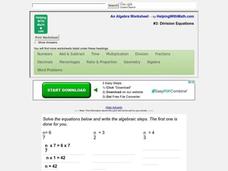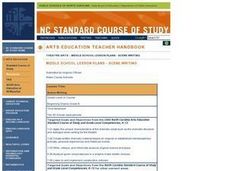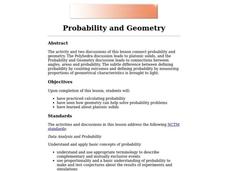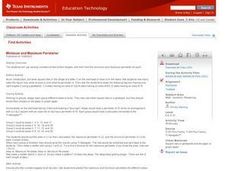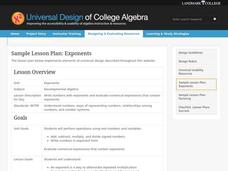Curated OER
Building Sets of 13 and 14
Compose and decompose sets of 13 and 14 and compare sets of each with your little learners. They use objects to construct sets of 13 and 14, record their answers, and compare sets in several different ways.
Curated OER
Fractions
Fourth graders use pattern blocks and fraction identification cards to create and identify fractions. In this fractions lesson plan, 4th graders identify fractions in a pizza, and make fractions with markers.
Curated OER
Frost Depth Study
Students complete activities to study the frost and frost depth. In this frost study lesson, students use frost tubes to study and measure the frost at their school. Students measure the frost in the tube and enter their data online to...
Virginia Department of Education
Exploring 3-D Geometry
Take young mathematicians on an exploration of the world of 3-D geometry with this seven-lesson unit. After first defining the terms perimeter, area, and volume and how they apply to the real world, students continue on to learn the...
Pennsylvania Department of Education
Seeing Doubles
Young scholars work with dominoes to recognize the number of spots on each side as they relate to addition facts. In this seeing doubles lesson, students make triangle shaped flash cards for the double facts. Young scholars represent the...
Curated OER
Past Continuous
In this past continuous form instructional activity, students analyze 8 pictures and read a question about each one. Students write the answer to each. This is intended for ESL use.
Curated OER
How Big is 1 Million?
In this greater numbers worksheet, students enhance their understanding of the number 1 million by answer the six word problems that use the number in various forms.
Curated OER
Place Value: Ones, Tens and Hundreds: Worksheet 3
In this place value instructional activity, students write numbers in standard form, write the place of underlined digits and answer one related word problem.
Curated OER
NUMBER MATCH
Students relate the written form to the spoken form of familiar language (e.g., simple greeting, basic vocabulary, numbers, dates, time). They practice counting objects, identifying numbers when presented on flash cards in random order...
Curated OER
Using Tables to Solve Linear Functions
Oh that intercept! Budding algebra masters solve linear equations from standard to intercept form. They identify the slope and y-intercept to help graph the lines, an then create coordinate pairs using a table of values. Great TI tips...
Curated OER
Division Equations
In this division worksheet, students solve algebraic problems containing fractions. This one-page worksheet contains 11 problems. Answers are provided. This worksheet may be completed on-line or produced in printed form.
Ohio Department of Education
Fraction and Decimal Equivalency
Mathematicians make representations of fractional parts of a whole and learn that a decimal is another way to represent a fractional part. Understanding is extended by comparing and ordering fractions and decimals on a number line. This...
Curated OER
Scene Writing
Eighth graders create an original scene or short one-act play within specified guidelines. Assessment is based upon the performance of student-created scenes during class time. Rubrics for assessment and connection to state standards...
Helping with Math
Writing Simple Equations
For this simple equations worksheet, students examine diagrams and write equations to support the information in the diagram. This one-page worksheet contains 10 problems. This worksheet may be completed on-line or produced in printed...
Curated OER
Starting at the Beginning
Sixth graders develop basic band skills through in-class instruction, individual practice, and the Essential Elements band method. Instruction is teacher-led with examples and drill/practice. National Standards for the arts are...
Curated OER
Probability and Geometry
Students explore the ways Geometry can help solve probability problems. Students describe platonic solids and practice calculating probability using an online resource. They construct dice with various numbers of sides to demonstrate...
Curated OER
Master Spy
Students explain that a code is a system of symbols, letters, words, or signals that are used instead of ordinary words and numbers to send messages or to store information. They practice deciphering a variety of secret codes used in...
Curated OER
Victorian America: Reflections of Life in Death
Students, after viewing a video and researching the changes in society during the Victorian period, assess a prediction-confirmation guide to consider how changes in burial customs in the late 1800's reflect the changes in society as a...
Curated OER
Landforms
Learners study how landforms affect all aspects of a community. Students work in groups to identify landforms from other works of art. In cooperative groups Learners select a work of art depicting a particular land form and create a poem.
Curated OER
Understanding Hurricanes and the ER-2
Young scholars study hurricanes; in particular, what they look like, how they are formed, how they are categorized, how they are named, and how they are tracked. They examine the science of hurricanes as well as the mathematics of...
Curated OER
Paper Towers
Students have the opportunity to use model-building as a way to help comprehend the forces and phenomena at work in the world around them. They describe gravity as a universal force that pulls everything toward the center of the earth....
Curated OER
Minimum and Maximum Perimeter
Pupils practice a variety of strategies with varying numbers of tiles to form shapes and then find the minimum and maximum perimeter for each one. Each group is assigned a different area to build either with square tiles or a geoboard....
Curated OER
Is the Hudson River Too Salty to Drink?
Students explore reasons for varied salinity in bodies of water. In this geographical inquiry lesson, students use a variety of visual and written information including maps, data tables, and graphs, to form a hypothesis as to why the...
Curated OER
Exponents
Ninth graders solve problems involving exponential functions. In this algebra lesson, 9th graders apply their knowledge of exponential properties to add, multiply, divide and subtract exponential functions. They perform these operations...












